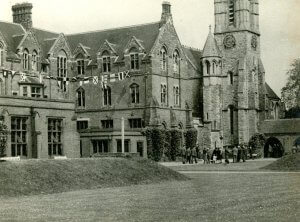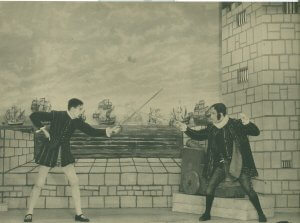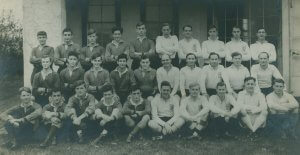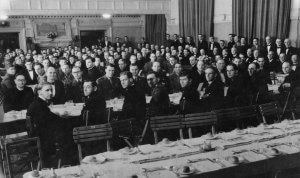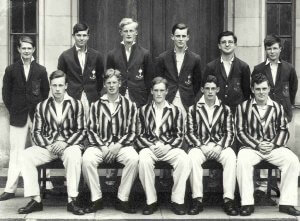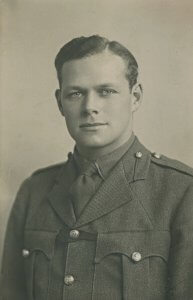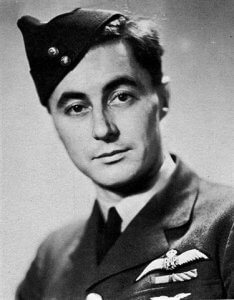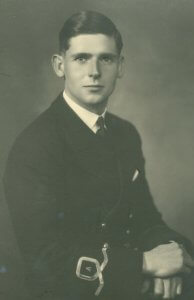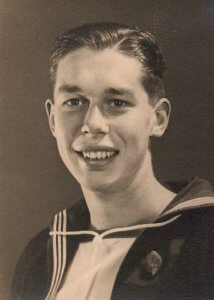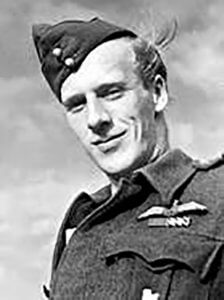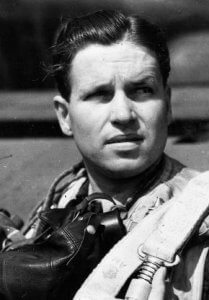VE Day at Teddies, and the end of WWII
We know from the Chronicles of the time that on VE Day in 1945, Teddies came alive with great celebration, including the Chapel being lit up for the first time after five years of blackout. We thank The School Archivist, Chris Nathan OSE for the information contained in the account below, with all quotations from relevant Chronicles.
‘The official ending of the war with Germany at a minute past midnight on the 8th May was the occasion of a burst of cheering and ‘Goodnights’ from dormitory to dormitory; they were the climax of a day which was the perfect corollary of D-day, less than a year before. The service in Chapel, the broadcasts of the Prime Minister and of the King formed the corpor
ate act of thanksgiving and recognition; the community sing-song in Big School, to which Mr. Arthur Cranmer (visiting professional singer and old friend of the School) and Mr. Edward Manning (Music Teacher) most kindly contributed their services, gave vent to a full expression of enthusiasm and festivity. Then the Warden spoke to the School of the 1300 OSE (actually 1500) who have served in the war, all of whom including those who have fallen, would be present in spirit under the reflection of the flood-lit Chapel.’
As far as the Chronicle was concerned the actual end of the war and VE Day fell just before two issues, in July 1945 (509) and December 1945 (510) so a lot of the statistics printed later turned to be incorrect, however they give a flavour of what was happening at that exact time at the School.
The editorial of the 509 was joyful, yet tinged with sadness. Extracts included:
‘The euphoria was seriously dampened by the deaths of two teachers right at this time of great joy, Wilfred ‘Willy’ Weeks and R.B. Maxse. Weeks very sadly took his own life in the Science Labs and Maxse from natural causes.’
The previous Gaudy in June was described as a joyous event despite ‘there being no ice-cream, strawberries and cream and no band’. But there was much to balance things up: ‘parents in abundance – the restoration of petrol ration brought them in greater comfort’ and even ‘upwards of a dozen returned POWs, who came to St. Edward’s at this, their first opportunity to enjoy one of the things they had looked back to with wistful yearnings’. The Warden asked everyone to stand and remember the 129 OSE killed in the conflict (actually 151) and ‘recalled the honours won by the Old Boys as far as they are known, honours won for the most part by amateur warriors, ordinary boys made strong and skilful by the native, good-humoured toughness and by the greatness of their cause’.
‘The whole event was finished off in the evening by the traditional Summer Concert performed by the School Choir and the Choral Society, around 80 singers in all. The finale was the ‘Skye Boat Song’ and left not a dry eye in the house’.
In Issue 510, after a time of reflection of six months, the Chronicle editorial was much more concentrated on peace, the surrender of the Japanese and the return of staff to their former pre-war duties. Temporary teachers hired as stop gaps at the outbreak now left, and returned to their retirement, and new younger teachers appeared.
The VJ peal on 15th August 1945 on the Chapel Bells was rung by three older OSE, including two future Housemasters John ‘Bill’ Eardley and Gerald ‘Gerry’ Segar. None of the existing School population had been trained up, since the bells had been silent throughout the war!
Commemoration in November 1945 was a very emotional affair and was well reported in this later issue. This was the OSE’s time and the first ‘real’ such event for seven years. Over 200 came ‘most of them straight from their tanks, their aircraft, their warships or their POW camps, with their decorations and wounds, fresh upon them, made their way to the School’.
‘We remembered our founders, benefactors and absent friends with a greater intensity of feeling and devotion than ever before. As we stood, the Warden (apparently with tears pouring down his face), read the names of those OSE who had fallen in the war, pride and sorrow were mingled in our hearts, in that great paradox of the Christian religion, the glory of the cross’.
The social side was not missed, and the traditional rugby match between the School and OSE saw the former win a close game 9-6. The School Play, in Big School, was Sheridan’s The Critic, and played over two nights to high praise (not always the case in the Chronicle)!
In the evening came the 82nd OSE Dinner at the Randolph Hotel with 180 present either in black tie or uniform. The President was Sir Francis Wylie, the first OSE ever to achieve a Double First at Oxford University. Two Wardens were present and twenty members of the teaching staff. Again it was an evening of laughter, sadness and nostalgia.
Finally, Henry Kendall, the venerated Warden of those war time years, wrote a published letter in this Chronicle. He was always a mixture of stoicism and emotion and the final paragraph probably states how all felt at that time.
‘At the first meeting in peace-time since June 1939, the Governors of St. Edward’s School wish to place on record their pride in the distinguished services rendered by the Old Boys in the war, their sympathy with the relatives of those who have given their lives, and their hope that in the future, as in the past, the school may send out a succession of boys to give as high service to their country in peace, as their elder brothers have given in war’.
We have records of all 151 OSE and I teacher who fell in WW2, and tribute to them and others who gave their lives so honourably, there are accounts of a several of them below:
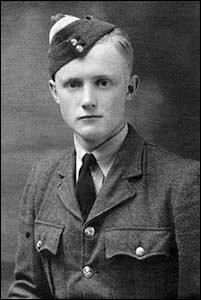 Arthur Banks, Sergeant Pilot, Royal Airforce Volunteer Reserve. Killed in enemy hands, Italy September 1944. Awarded George Cross, posthumously, mentioned in despatches.
Arthur Banks, Sergeant Pilot, Royal Airforce Volunteer Reserve. Killed in enemy hands, Italy September 1944. Awarded George Cross, posthumously, mentioned in despatches.
Paul Cooke, Second Lieutenant, Oxford & Buckinghamshire Light Infantry, Killed in action, Comines, Belgium May 1940.
Alec Cranswick, Squadron Leader, Pathfinders Royal Air Force. Killed in action over Villecresnes, France July 1944. Awarded Distinguished Service Order and Distinguished Flying Cross.
Eric Dixon, Sub Lieutenant, Fleet Air Arm Royal Navy Volunteer Reserve. Killed in action over coast of Tripoli, Libya, April 1941. Mentioned in despatches (posthumously).
Edward Trend, Leading Airman, Fleet Air Arm, Royal Naval Volunteer Reserve. Killed in action trying flight over Arbroath, Scotland.
Adrian Warburton, Wing Commander, Royal air Force. He was awarded the Distinguished Service Order (DSO) and Bar, Distinguished Flying Cross (DFC) and two Bars, and the American DFC. Killed in action, probably in 1944 in a mission over Munich.
Guy Gibson, Group Captain, Bomber Command, Royal Air Force. Killed in action over Steenbergen, Netherlands, September 1944. Victoria Cross, Distinguished Service Order and Bar, Distinguished Flying Cross and Bar, Commander of the Legion of Merit (United States of America).
